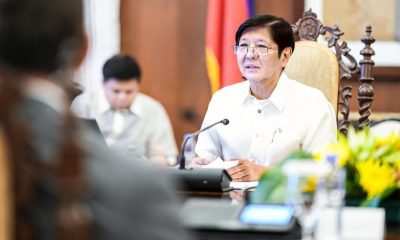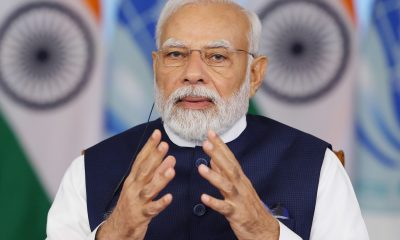Business and Economy
A look at how Trump might shake things up in Asia

A look at how Trump might shake things up in Asia
(Photo: Gage Skidmore/Flickr)
BEIJING—Donald Trump has offered views on U.S. relations with Asia that could indicate radical shifts in long-standing policy toward the region. From opposing free trade agreements to confronting China and questioning Japan-South Korea alliances, he appears set to be charting a course far different from previous administrations.
Yet, in other areas, including North Korea, India and Pakistan, Trump appears ready to carry forward well-established U.S. policy. As Trump prepares to be sworn-in as president on Friday, here is a look at some of the stand-out issues and how developments might play out:
TRADE—Trump says he plans to scrap the 12-nation trade pact known as the Trans Pacific Partnership agreement, or TPP. The pact was the centerpiece of the Obama administration’s outreach policy to America’s Asian partners known as “the pivot,” which also involves a greater military commitment to the region.
Obama said the TPP would allow the U.S. to impose higher labour, environmental and human-rights standards, as well as give U.S. businesses access to some of the fastest-growing economies. The deal would have slashed 18,000 taxes that other countries impose on American goods and services, but Congress failed to act amid skepticism from both Republicans and Democrats.
Trump’s opposition to free-trade agreements has fueled fears of protectionism and puts him at odds not only with U.S. trading partners but also with many in the Republican Party. Killing the TPP may open the way for other regional free-trade initiatives, including those pushed by rival China.
“With the U.S. withdrawing from TPP, Japan will have to redesign its external economic policy,” said Harukata Takenaka, politics professor at National Graduate Institute for Policy Studies. Other options “may not be easy,” Takenaka said.
CHINA—Trump raised China in speech after speech during his campaign, at times accusing the country of ripping America off in trade and threatening a 45 per cent tariff on all Chinese imports.
Things turned far more serious after his election win when he took a phone call from the president of self-governing Taiwan, upending four decades of diplomatic protocol barring such direct contacts. Critics accused him of ignoring the “one-China policy,” long considered unassailable in China-U.S. relations, to which Trump responded by questioning why the U.S. should be bound by such an arrangement without economic incentives.
He again touched on the issue in an interview with The Wall Street Journal published Friday, saying “everything is under negotiation, including ‘one China.’” While the Chinese government’s response was muted, the official China Daily newspaper said he was “playing with fire.”
Trump has also criticized the Chinese military’s island-building program in the South China Sea, and accused it of blocking U.S. imports through high taxes and manipulating its currency to the detriment of American exports.
ALLIANCES WITH JAPAN AND SOUTH KOREA—Trump raised eyebrows during the campaign when he appeared to question the inviolability of long-standing U.S. military alliances with Japan and South Korea, seen as bulwarks against North Korea’s military threats and China’s push for regional dominance. The two were included in a list of countries that Trump said he would be “respectfully asking … to pay more for the tremendous security we provide them.”
During the campaign, Trump suggested Japan and South Korea should obtain nuclear weapons so the U.S. would no longer be burdened with the costs of defending them, a disquieting notion in many Asian capitals. But after Trump’s election win, Japan’s Shinzo Abe became the first foreign leader to meet with him, sitting down in Trump Tower with the business mogul and his daughter, Ivanka.
Japan is concerned about how spill-over from China-U.S. conflicts might affect its economy and foreign relations, possibly compelling it to play a larger role in regional security, said Harukata Takenaka, politics professor at National Graduate Institute for Policy Studies. “Trump measures would be the top priority for Prime Minister Abe this year. The biggest question is that Trump is unpredictable,” he said.
NORTH KOREA’S NUCLEAR THREAT—Trump’s approach to North Korea probably offers the least divergence from previous administrations, but he faces stark choices on countering North Korean leader Kim Jong Un’s missile threat. After Kim, announced in his annual New Year’s address that the country had reached the “final stages” of developing an intercontinental ballistic missile, Trump responded by Twitter: “North Korea just stated that it is in the final stages of developing a nuclear weapon capable of reaching parts of the U.S. It won’t happen!”
Trump has not said how his approach to the North might differ from Barack Obama’s, although his campaign’s position paper talked of more “modern destroyers to counter the ballistic missile threat from Iran and North Korea.” That would appear to indicate continued support for deploying the advanced Terminal High-Altitude Area Defence, or THAAD, anti-missile system in South Korea, despite Chinese and Russian objections. Trump appears to be a firm believer that North Korea could be reined-in if only its sole significant ally China would tighten the screws.
INDIA AND PAKISTAN—During the campaign, Trump was largely positive toward both India and Pakistan, even while he piled negative rhetoric on China and other nations. However, his threat to ban Muslims from entering the U.S. has raised accusations of Islamophobia.
In the days after his win, Trump appeared to follow in the well-trodden path of seeking a balance between the nuclear rivals—albeit in his unorthodox style. A phone call between Trump and Pakistan’s prime minister was remarkable mainly for the effusive praise he reportedly lavished on the struggling state. Pakistan is a U.S. ally in the battle against Islamic extremism but is also close to U.S. rival in Asia, China. In its readout of that call, Pakistan said Trump described the country as “amazing” and expressed a desire to visit—something President Barack Obama did not do.
India’s national security adviser followed the Pakistan exchange with a low-key visit to Washington to meet with a senior Trump aide in a sign of New Delhi’s desire to forge close ties with the incoming U.S. administration.





















